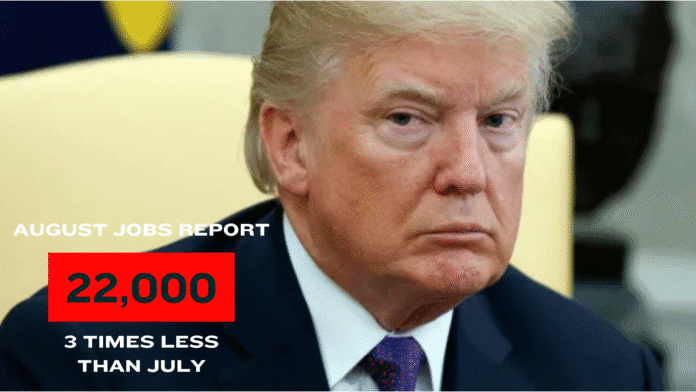In a move that sparked widespread controversy, President Donald Trump fired Bureau of Labor Statistics (BLS) Commissioner Erika McEntarfer on August 1, 2025, following a disappointing July jobs report. Trump accused her of manipulating data to portray a weaker economy, labeling the figures “RIGGED” on Truth Social and promising to install someone who would deliver “honest and accurate” numbers.
Yet today’s August jobs report — the first issued under interim leadership — paints an even bleaker picture. Job growth collapsed to just 22,000 additions, the unemployment rate rose to 4.3%, and prior months were revised downward even further. The unemployment rate now sits at its highest point since the COVID-19 era, underscoring the limits of political intervention in the face of economic realities.
Background: The July Catalyst
The BLS, founded in 1884, is widely regarded as a global gold standard for statistical integrity, producing vital data on employment, inflation, and productivity. Revisions to jobs numbers are routine as more complete information becomes available.
McEntarfer, a career economist with two decades of service, was confirmed with bipartisan support in 2024. Her tenure ended abruptly after July’s report showed only 73,000 new jobs — well below expectations — along with massive downward revisions erasing 258,000 jobs from May and June.
Trump blasted the report as politically motivated sabotage. Without evidence, he claimed McEntarfer, a Biden appointee, was inflating weaknesses to damage Republicans. Economists rejected the charge, noting such revisions occur under all administrations. Former Trump-era BLS Commissioner William Beach called the firing “groundless” and a threat to the agency’s credibility.
Interim Leadership and Independence
Following McEntarfer’s removal, Deputy Commissioner William Wiatrowski, a 37-year BLS veteran, automatically assumed the role of acting commissioner. Wiatrowski stressed continuity and transparency, overseeing today’s August release under the same rigorous methodology that has defined the agency for generations.
Critics say Trump’s move undermines public trust in neutral data. The American Statistical Association warned that firing a commissioner over unwelcome numbers threatens the independence of agencies essential for policymaking. Democrats like Chuck Schumer called the action authoritarian, while Trump allies praised it as accountability.
August Jobs Report: A Sharper Decline
The August report reveals that job growth has slowed to a crawl:
- 22,000 jobs added (versus July’s 73,000)
- Unemployment at 4.3%, the highest since October 2021
- June revised to a net loss of 13,000 jobs
Manufacturing shed 11,000 positions, government employment contracted, and 2025’s monthly average now sits at just 85,000 jobs — half the pace of 2024.
Economists attribute the slowdown not to statistical bias, but to broader policy choices:
- Tariffs and trade wars disrupting supply chains and exports
- Immigration restrictions shrinking the labor supply in agriculture and construction
- Federal layoffs and fiscal tightening reducing government payrolls
Markets and Federal Reserve
Wall Street’s initial reaction was volatile: major indexes fell more than 1% in early trading before rebounding on expectations the Federal Reserve will cut rates. Recession odds, according to J.P. Morgan, now stand at 40% by year-end.
Fed Chair Jerome Powell has signaled readiness to intervene if labor data weakens further. Today’s numbers appear to confirm that trajectory.
Trump’s Nominee: E.J. Antoni
On August 11, Trump nominated E.J. Antoni, chief economist at the Heritage Foundation, as permanent commissioner. Antoni, a vocal critic of the BLS, often echoes Trump’s claims that the agency undercounts growth and overstates inflation. His pending confirmation has raised alarm about politicization, with critics warning that BLS credibility could suffer if partisan influence overrides methodological rigor.
The Bigger Picture
Trump fired McEntarfer because he didn’t like the numbers. One month later, under his own interim leadership, the numbers are worse: fewer jobs, higher unemployment, and sharper revisions.
As one economist put it: “Firing the thermometer doesn’t cure the fever.”
The slowdown stems not from data manipulation, but from real-world forces — tariffs, immigration crackdowns, and fiscal tightening. And with unemployment climbing and growth stalling, no change in personnel can mask the trend.
The numbers, as ever, don’t lie. And today, they’re Trump’s problem more than McEntarfer’s.











